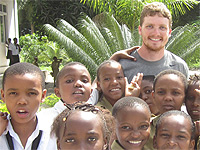Community College Students and Faculty Go to Tanzania

Kirkwood Community College student John Bruce with fourth graders he taught in Bagamoyo, Tanzania.
Immigrants from southeast Africa are always surprised when the blonde, blue-and-green eyed pharmacy technician at the Walgreen's in Cedar Rapids, Iowa, explains things to them in their native Swahili.
It is perhaps even more surprising that 25-year-old Elizabeth Englund picked up some of the language on a June 2012 service learning trip to Tanzania through Kirkwood Community College, where she is finishing studies that she hopes eventually will lead to pharmacy school.
The 133 individuals who participated in the service learning trip included Englund, six classmates, three faculty, and a staff member who spent three weeks in Tanzania helping children and sick people under the auspices of Cross-Cultural Solutions (CCS), a nonprofit that places volunteers in poor communities in 11 countries in Africa, Asia, and Latin America.
The Tanzania mission was part of a pilot project in which CCS has partnered with Community Colleges for International Development to offer $400,000 in Harris Wofford Global Service Fellowships to students from a half-dozen colleges in 2012, and another $400,000 in fellowships to 11 institutions for 2013. The fellowships, which take financial need into account, are intended to help CCS diversify the ranks of its volunteers.
Students worked alongside cadets from West Point and other U.S. volunteers in the city of Bagamoyo. Englund and a nursing student, working with a local charity, went out to the homes of five patients with HIV/AIDS to provide physical therapy and other care.
James Cochran, the Kirkwood math professor who led the trip, taught two dozen young children in a private elementary school along with one of his students, John Bruce, an Army veteran who served tours in Iraq and Afghanistan. Cochran had a fitting background for the duties. He spent two years teaching math in Kushigata, Japan, sister city to Marshalltown, Iowa, where he grew up and graduated from community college.
Bruce, now at the University of Iowa, was the first student Cochran recruited. He had taken algebra from Cochran, who lent him an autobiography of young Winston Churchill about the future prime minister's exploits in Indian and South Africa during the Boer War. When Dawn Wood, director of international programs at Kirkwood, chose Cochran to lead the Tanzania trip, "John was the first student I thought of," the math teacher said.
"He came and found me in one of my classes and asked if I would go. That's how I ended up in Tanzania," said Bruce, who also served a year in Korea after volunteering for the Army infantry at age 17. He rose to the rank of sergeant. Bruce taught math, geography and even Tanzanian civics to the schoolchildren, who spoke and read English.
Englund and her compatriot, nursing student Elissa, faced a more daunting task, heading out each morning to the mud-and-brick homes of five AIDS patients, some with multiple maladies. "We'd get right on the ground with them and try to do stretches," she recalled. They helped a woman with polio use a walker and at one point Englund carried her into the ocean for a dip. They gave a sponge bath to a former soldier they called Captain. "We couldn't say much in their language, but they knew we were there to help them," she said.
Englund said she had no fear of contracting HIV and her decision to go was strongly supported by her mother, a nurse.
The volunteers and others helped townspeople lay the foundations for a new school. "We did concrete work for two days, grueling labor, lifting buckets of rock and cement," said Cochran.
Bruce, now majoring in international relations, may re-enlist after getting his bachelor's degree to pursue a career as an officer or seek a posting with the U.S. State Department or some other government service. "There are parts of the Tanzania trip I still think about all the time," he said. "I know sometimes people in some parts of the world can have a pretty negative view of Americans and our lavish lifestyle. I hope we showed them a good side."
Englund, who raised money from her church for the trip and organized a drive at Christmas to send textbooks and supplies to Bagamoyo, hopes to do volunteer work abroad one day as a pharmacist. "I'm more aware of things, more appreciative of things I have," she said. "Over there it was a big deal to find a Band-Aid."
Most of the students received the Wofford Fellowships that covered the costs of the CCS program and all received an additional $1,000 scholarship that Kirkwood's foundation provides every student who does service abroad. The college has sent health students to Guatemala for the past eight years; President Mick Starcevich was a volunteer on the 2011 trip. It also does service learning in the Solomon Islands and recently sent a group to Peru through the CCID program.
Even with the scholarships, the students still had to pay $2,000 to $3,000, but Cochran told them it would have cost them $6,000 to $7,000 "to do this trip on your own."
This is an excerpt of "Local Goes Global" by Christopher Connell about community colleges getting involved with international development, which appeared in the March/April 2013 issue of International Educator .
Photo credit: Kirkwood Community College
Homepage image: Geir Olav Lyngfjell / Shutterstock.com
